- NEW DVD Series – Stone Setting with Bezels
- Tube Set Charm by Kim St. Jean
- Prong Basket Pendant by Kim St. Jean
- NEW DVD Series – Stone Setting with Cold Connections
- New DVD Series – Stone Setting with Wire
- NEW DVD Series: Introduction to Stone Setting by Kim St. Jean
- Featured Tool: Bracelet Bending Plier
- NEW Dvd by Eva Sherman
- Fun, Fast Fold Forming DVD Series
- Double Band Ear Cuff from Alex Simkin
Natural Jasper Stones – Cabochon Gemstones
Today we’re going to look at Jasper—specifically, what kinds of jasper are out there, where they come from, and what’s so special about picture jasper!
A member of the chalcedony family, jasper is extremely versatile; it has been used in carvings, seals, cabochons, beads, and has even been used in fire-making techniques. Jasper is a semi-precious, opaque, and relatively common stone; what makes jasper so unique is the wide array of colors and patterns it comes in!
Jasper can be found all over the world; common sources include Russia, Uruguay, India, Egypt, Canada, Brazil, Australia, Madagascar, and the United States. Jasper usually has banding, matrix-like inclusions, or a spotted appearance.
Jasper stones that possess unusual patterns, characteristics, and coloring are called “picture jasper.” Types of jasper that resemble a certain pattern, color, or scene are often named for their visual characteristics, and these names can vary from region to region. We call our jasper stones by the names we’re familiar with–but you may recognize a jasper stone as having another name entirely!
Picture jasper stones often resemble animal coats, such as Dalmatian Jasper (jasper resembling the coloring and spots of a Dalmatian dog), Leopard Skin Jasper, and Zebra Jasper (which can come in both black and white stripes, and brown and pink stripes!).
Picture jasper can also take the form of a “natural photograph,” showing a landscape or skyscape. See in this stone, how the inclusions and coloring appear to form a field with a river, or perhaps even clouds:
And that’s all formed naturally!
Another form of jasper I love is called Paint Brush Jasper, named that way because it looks like someone has dribbled paint along the surface of the stone! You can imagine the ink spreading along the stone, seeping into it and expanding, forming ink drops and pools. In most paint brush jasper, the stone is light, often gray, with dark inclusions forming the “paint.” This is one of my most favorite cabochons we stock; even though it’s a paint brush jasper stone, it looks like a scene of a river surrounded by trees–what does it look like to you?
That’s part of the appeal of Jasper, especially picture stone jasper: your customers may see something in the stone that no one else sees, and it becomes special to them. Some people enjoy finding hidden symbols and figures, giving the stone an important significance that only they realize.
Jasper stones are relatively easy to dye, and can imitate lapis lazuli stones fairly well. However, many kinds of jasper possess naturally vivid and unique coloring, and are named for their coloring! Take a look at this poppy jasper cabochon:
Doesn’t it just glow? The crimson and red hues play with light and have an unmistakable poppy-like feel. And poppy jasper is said to bring joy into a person’s life–what a lovely stone to wear as a pendant!
Wire-Sculpture stocks many, many kinds of jasper, in both jasper bead and cabochon forms. Here’s a list of the jasper cabochons we carry:
- Autumn Jasper
- Brecciated Jasper
- Dalmatian Jasper
- Fossil Jasper (often contains insects of flowers; “jasperized wood” is another term for petrified wood)
- Leopard Skin Jasper
- Paint Brush Jasper
- Picasso Jasper (named for the abstract, inclusion strokes and glowing colors)
- Picture Stone Jasper
- Poppy Jasper
- Red Jasper
- Zebra Jasper
…And we’re constantly getting new cabochons and beads in stock!
So check out our gemstone cabochons and peek at all our jasper cabs. Available in a wide variety of sizes and shapes, you can use our jasper stones in necklaces, rings, pendants, bangles, hairpieces–anything you can think of! Jasper’s also a great stone to practice your wire wrapping techniques on, as chalcedony is about a 6 or 7 on Mohs scale of hardness. These stones are guaranteed to be unique and one-of-a-kind; give your customers a lovely, natural stone that they will cherish!
So how about you? What are your favorite kinds of jasper, and what names for picture jasper do you know that we haven’t covered?





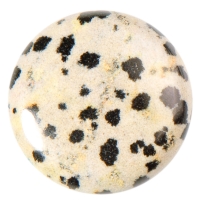
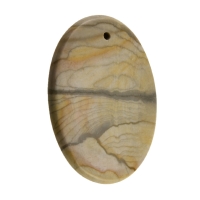
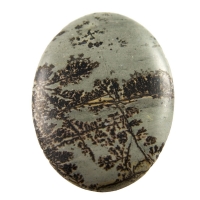
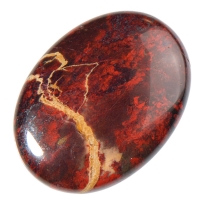
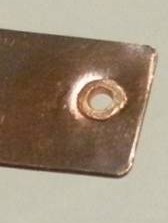
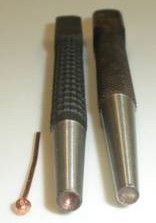
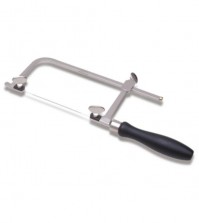
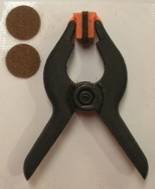

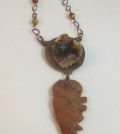
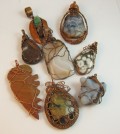

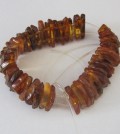

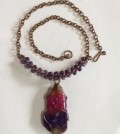
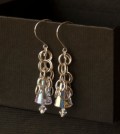
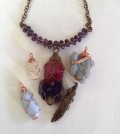
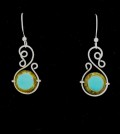
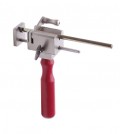
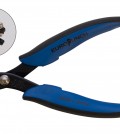
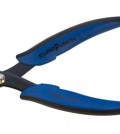
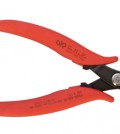
Patti
April 16, 2010 at 11:40 pm
Loved the article. Wonder if you can do some wirework that looks good with picture jasper and show us that.
Pingback: pligg.com
Pingback: dropjack.com
marie matulis
February 1, 2015 at 6:56 pm
I am trying to find out the name of the crystal that closely resembles tourmalinated jasper, has somewhat more black streaks than that type of jasper.